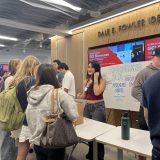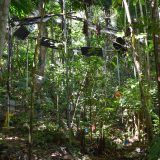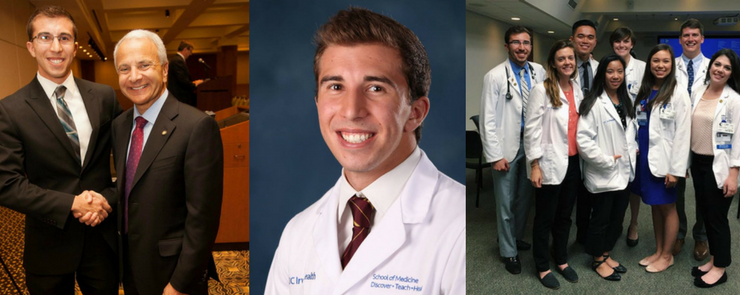
Secrets to Success: Adam Kalawi ’14 Alumni Interview “The secret to success is genuine interest, tenacity, and effective time management.”
April 14, 2017
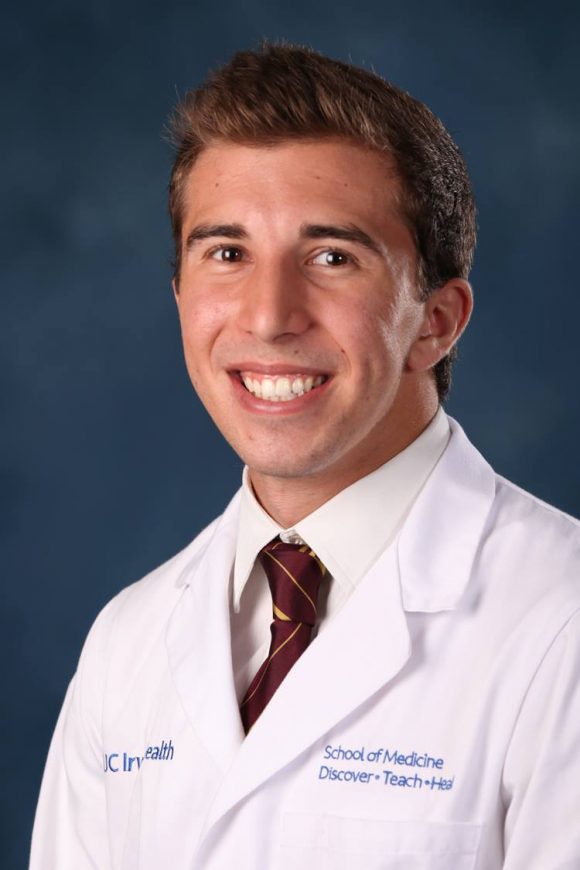 We recently caught up with biochemistry and molecular biology alumnus Adam Kalawi ’14. Adam accomplished an incredible amount of achievements during his years at Chapman. To name a few, he was recognized for 10 honors and awards, was a part of 4 organizations, and was a part of the University Honors Program. We asked him a few questions including what helped him achieve all his success at Chapman and how he managed his time, being so busy.
We recently caught up with biochemistry and molecular biology alumnus Adam Kalawi ’14. Adam accomplished an incredible amount of achievements during his years at Chapman. To name a few, he was recognized for 10 honors and awards, was a part of 4 organizations, and was a part of the University Honors Program. We asked him a few questions including what helped him achieve all his success at Chapman and how he managed his time, being so busy.
What have you been doing since graduating Chapman?
Since I graduated from Chapman in Spring of 2014 I have kept busy in my pursuit of becoming a doctor. I started medical school at UC Irvine School of Medicine in Fall of 2014 where I have continued to stay busy with many extracurricular activities. Most notably I was selected as one of Children’s Hospital of Los Angeles’ Summer Oncology Research Fellows, where I had the opportunity to conduct advanced Immuno-Oncology research looking for ways to stimulate natural killer cells in the fight against treatment-resistant Neuroblastoma, a particularly terrible pediatric cancer. I am currently in my 3rd year of medical school and just finished my Surgery rotation. Assuming nothing changes in the next few months I will be applying to Pediatric programs for residency, with the aim of some day becoming a Pediatric Cardiologist.
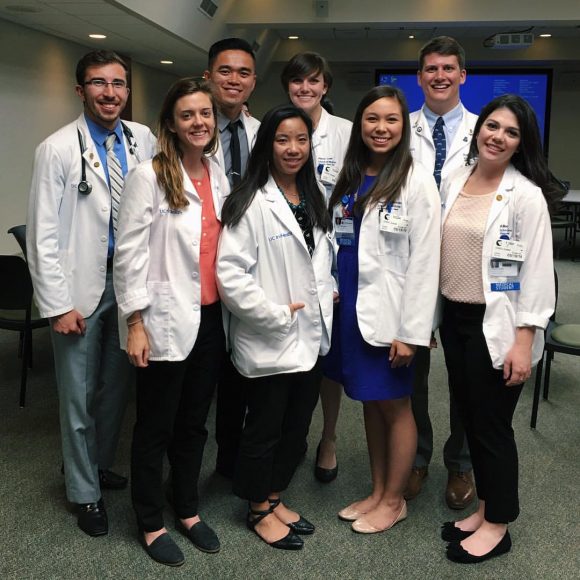
How did you get involved in Pediatrics 2040 as the Robotics and Robotic Surgery Abstract Competition winner?
They say luck is when preparation meets opportunity, and in the summer of 2013 I had a little bit of both on my side. During this summer I participated as one of the first Medical Intelligence and Innovations interns at CHOC (Children’s hospital of Orange County). As part of our internship we were encouraged to write abstract proposals for an upcoming conference on innovation in pediatric medicine. I chose to write on an idea that I had that combined my understanding of lag in video games with my understanding of latency in robotic telesurgery, and I was fortunate enough to be selected to present on the main stage of this conference. The biggest lesson for others with this story is to 1) stay sharp and 2) put yourself out there and take on all the opportunities that pass by (Open Your Window of Opportunity, if you will).
How did you manage to be involved in so many places at a time, yet still be so successful in all of them?
There are really three key components for how I did so much during my short time at Chapman: genuine interest, tenacity, and effective time management.
My number one rule when I got to Chapman was that I would not sign up for anything that I did not truly want to do. I joined Delta Tau Delta because I admired the Fraternity’s values; I got involved with the Orientation program because I felt that my orientation experience played a large part in my success; I got involved with research because I wanted to understand how the world worked… the list goes on. I can attribute my success in each of these involvements to my genuine interest in each organization and its future.
Sparing the details, when I was a junior in high school I happened to get quite sick. This experience lit a fire in me that gave me an energy and drive I had never experienced before. I tried to channel this determination into living with as much purpose as possible during college. I can attribute the energy for all of my involvements to this determination.
Finally, as boring as it may be, if you are going to be very involved you have to have a plan for how you are going to do it all. I personally set aside every Sunday to plan out my week. On a bigger scale, I used part of every break to reflect on the courses I had just taken as well as my plan for the rest of college and my involvements for the next few years. I can attribute the sheer number of my involvements, and my ability to do well in classes, to this meticulous time management strategy.
What did you do as a student that you think made you so successful?
It is hard to say exactly what I did to be successful during my time at Chapman, so instead I will highlight things I’ve noticed in other successful people that I try to emulate.
“Be relentlessly curious” would be my first piece of advice to anyone trying to grow in the field of science (or anything really). Physics and Chemistry can be some of the dullest subjects in the world or they could be the study of how countless dying stars used their last fleeting breaths to give rise to all of the elements in and around us. Organic Chemistry can be the study of letters and lines on paper or it can be the careful observation of atoms intricately dancing to form the medications we use to save lives. Biology can be as simple as the classic “the mitochondria is the powerhouse of the cell”, or it can be a tremendous journey through time and logic trying to piece together the puzzle of our very existence. In all of these cases curiosity is all that distinguishes the former interpretation from the latter.
“Learn it until you can teach it” would be my second key piece of advice. Teaching is not only among the noblest professions one can pursue in life, it is also among the most effective ways to commit ideas and theories to memory. You lose nothing by helping those around you succeed, but you gain a great deal.
“Cherish those that anchor you” would be my final piece of advice. A wiser man than I once said, “In great pursuits, even failure is excellence”. What he neglected to mention is that failure still hurts and there will be a lot of it! Though [you’re only asking me about] my successes, I have had many failures. Those that stuck by me when I was at my lowest points have earned a permanent place in my heart. Among those, I would like to particularly thank my best friend of 7 years, Jessica Rabalais (I love you), and my dearest family (for teaching me how to use a spoon, among other prerequisites for college and beyond).
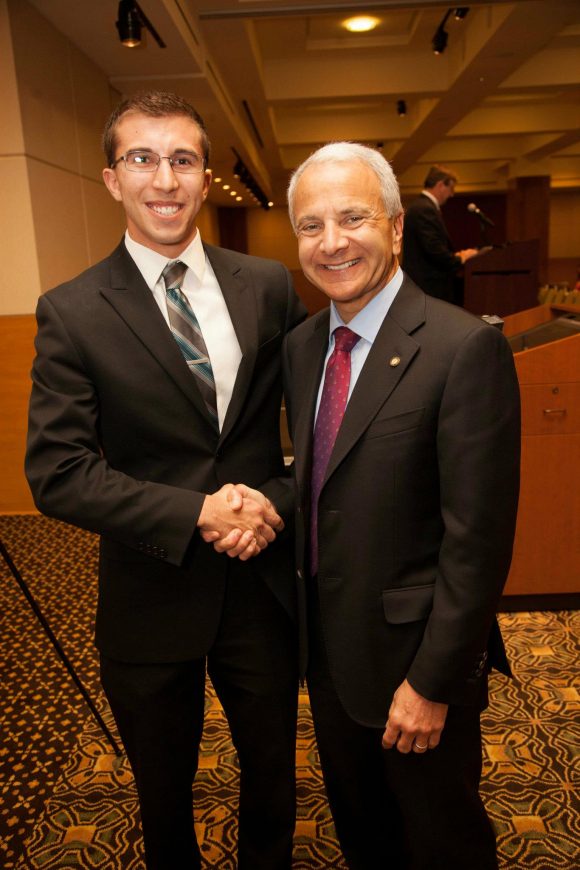
Was being a part of a fraternity any help in pursuing your career?
When I first arrived at Chapman I would have never seen myself in a fraternity; however, throughout my first few weeks of college I noticed on thing in common among all of the men that I admired as leaders on campus, they were all Delts. After careful consideration I chose to rush Delta Tau Delta and was fortunate enough to be accepted as a brother of their Upsilon pledge class in the Fall of 2010.
It is hard to say if being a Delt directly helped me in pursuing my career, but I can undoubtedly say it helped me become the man I am today. It provided me with a framework of values to reflect on weekly, it encouraged me to be committed to a life of excellence, and most importantly it gave me the opportunity to lead and be led in a relatively safe environment. I can undoubtedly say that the skills I learned as a leader in Delta Tau Delta have been directly transferable to my experience as a leader in medical school (and hopefully beyond).
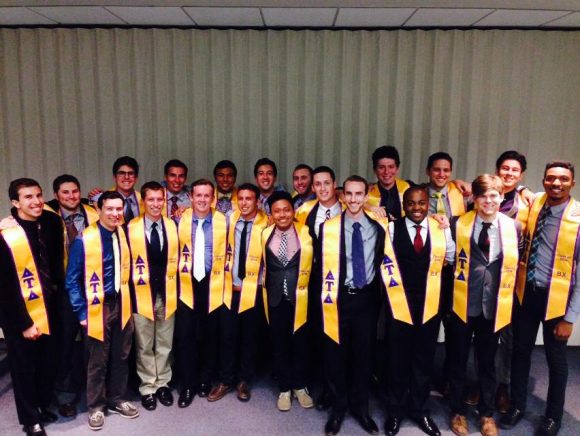
What insight would you give to current science students and alumni who are searching for employment or applying to graduate school in your field?
For those pursuing medical school specifically, be persistent. It is very difficult to get into medical school in the current environment and it is 100% okay if you need to take multiple tries at it. The majority of my class took 2+ years off after finishing college and they are doing great. If you need to, consider other paths that can provide similar satisfaction without the same unforgiving application process.
As far as specific detailed advice on how to get into medical school, I’d be happy to give a ~1 hour talk on it if a group of students are interested. I’ve done this for free for AMSA in the past and would be more than willing to come out any time there is a group of students that are interested. If this is something you or your student organization would like to host, feel free to e-mail me to coordinate (adam.kalawi@gmail.com).
